
LMS solution with ERP features for an eLearning company
Itransition delivered an Odoo-based LMS solution equipped with ERP features that enables end-to-end parenting education online.
Context
Our customer is a US-based eLearning company specializing in parenting education. They create and provide a variety of educational courses, including a curriculum that teaches high school educators how to teach parenting classes to students.
The customer used a learning management system (LMS) as a means to deliver their educational courses and learning programs, but the solution did not meet their needs fully. The legacy LMS didn’t have the required functionality for schools onboarding and exporting student submissions to external platforms and couldn’t support some processes and automations. Initially, the customer wanted to upgrade the solution but had to abandon the plan because the software was closed-source and customizations would be difficult to implement. Eventually, the company decided to go for a new solution, equipped, apart from LMS-specific features, with features for selecting new schools for program participation and onboarding them, digitally signing documents, and automating certain processes.
Therefore, the customer needed a technology consultant and software vendor that would analyze the LMS solutions on the market, choose the one that met their requirements and aligned with their business processes, and carried out its implementation. The customer considered Itransition a good fit for this project as we have accumulated vast expertise in eLearning and LMS consulting and have successfully implemented multiple relevant projects.
Solution
Itransition delivered an eLearning platform based on Odoo. The solution allows for organizing online lectures, conducting tests and surveys, and selecting schools to participate in the program, as well as enabling teacher-student communication and online meetings. The platform also has features for document management, including e-signature, billing, and report generation. Finally, we built a new website and customized it to serve as a client portal facilitating school onboarding and course management.
Discovery
Itransition’s team managed to complete the discovery phase in a couple of weeks instead of a month as initially planned. We reviewed the customer’s school and teacher onboarding workflow, the overall educational process, and the functionality of their current LMS. We also thoroughly examined the customer’s business processes and visualized them in the form of diagrams.
Eventually, we figured out that the customer needed a full-blown ERP system implementation instead of an LMS, open-source and easily customizable in line with the project’s needs. The speed of implementation was also an important consideration since the platform was expected to be launched in time for the upcoming academic year.
Our team analyzed around 10 ERP/LMS solutions comparing them based on 30+ available features. Eventually, we picked the four best-fitting options, among which were Moodle, Odoo Community (CE) and Odoo Enterprise (EE), and LifterLMS, a WordPress-based LMS.
Having compared the solutions, we concluded that the system built on top of the Odoo ERP platform was the best solution as it matched the customer’s requirements and allowed the customer to get started quickly and at a comparably low cost. We also chose Odoo Enterprise for its full-fledged accounting features and an in-built electronic document signature feature.
What is more, Odoo Enterprise can be hosted on the Odoo.sh dedicated cloud platform, so we could deploy the eLearning platform in a couple of clicks. Last but not least, being an Odoo Silver Partner, Itransition has already developed wide expertise in implementing and customizing Odoo solutions.
Business process enablement
At the beginning of this stage, our business analyst prepared the detailed diagrams of the customer’s business processes in line with the modules to be implemented and visualized the capabilities the new system enables.
Application
School representatives have to fill in application surveys, entering various data about their school, to participate in the training program. After the application is submitted, the system creates an opportunity in CRM. The customer then reviews the application and decides whether a school can be onboarded for the coming academic year.
Preparation
As soon as the school’s application is accepted, it needs to sign a Memorandum of Understanding (MoU) based on the template our team prepared. After that, the opportunity automatically proceeds to the next stage, with the system creating a project and sending the client a customization survey and invitation to the teacher course. After the client submits the customization survey, they can upload teachers’ contacts to the system. The system sends course invitations to contacts provided by the teacher and notifies them about scheduled live webinars, while the customer’s employees create a customized course.
Training
Teachers enroll in the course and undergo training, which includes both webinars on using the system and learning materials for teaching students. In case teachers need technical assistance, they can schedule a meeting with the customer’s employees. When the training is completed, the system notifies employees and sends teachers a course satisfaction survey. Teachers take the survey, get their annual certificate, and upload the list of students with their personal accounts on the web portal, with all students linked to the teacher.
Course delivery
Each school can choose when the program should start, so upon commencement, students get access to the course. After each lesson, students submit lesson reflection and take a quiz, while teachers submit lesson quality assessment. At the end of the semester, students submit their final project and finish the course, receiving the course completion certificate.
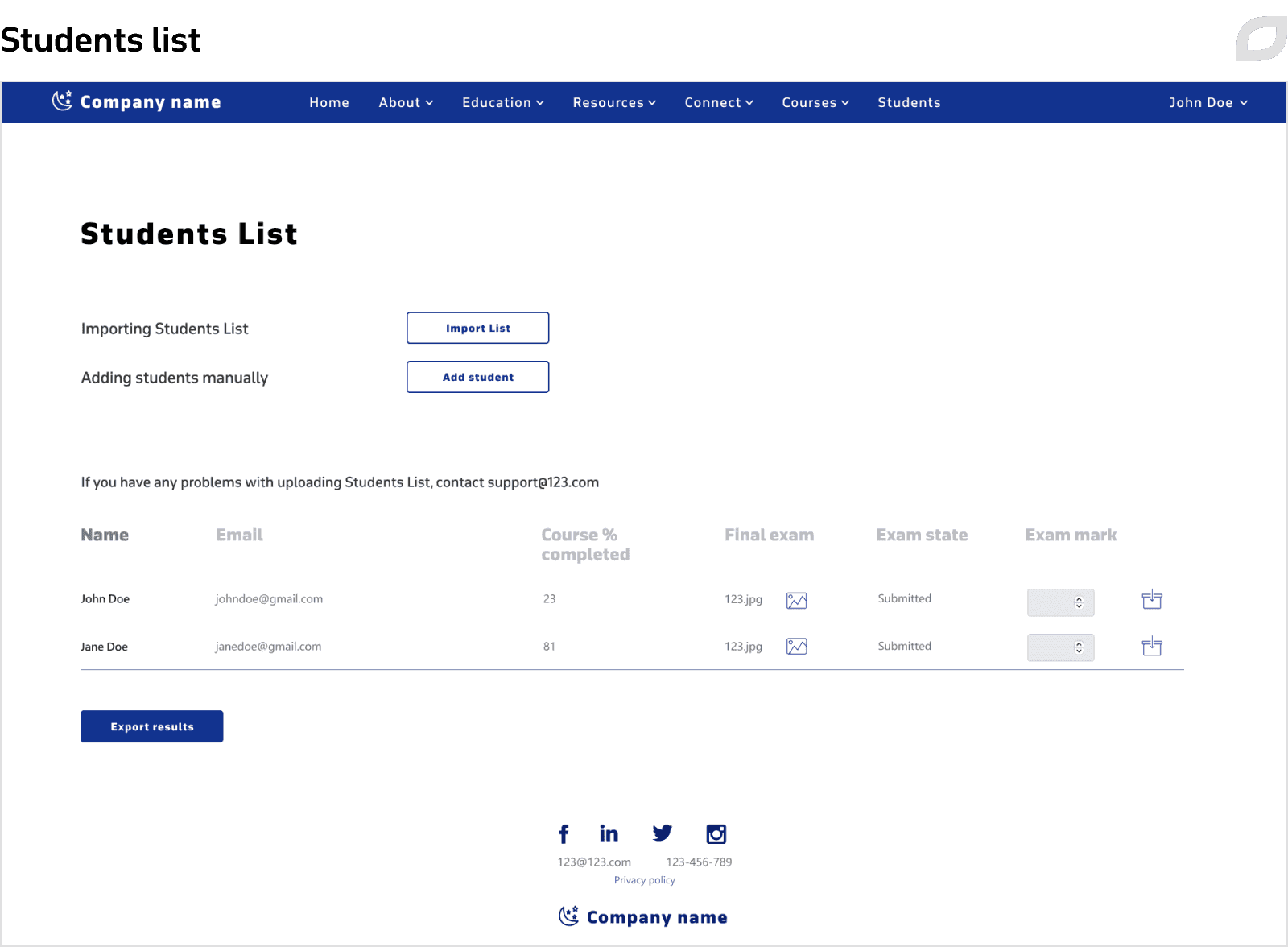
Evaluation
After all students finish the course, the system sends a notification to the customer’s employees and asks teachers to take a survey. Then employees generate final evaluation reports containing anonymized survey results from students and send them to the universities that collect statistical data. When the semester ends, students’ data is archived, so when the next semester starts, teachers upload new student lists.
Implementation
The system implementation was closely related to the business workflows as entities were closely intertwined with each other. Although most of the required functionality was available out of the box, our team had to link all of the modules to a unified business process to enable a smooth transition from one stage to another.
To cover all required workflows, we applied the following Odoo modules:
- CRM to enable complete business process automation and provide for setting up the entire learning process. CRM contains statistical data on schools and their applications (students, teachers, surveys, course details, contracts, and so on) and processes all applications submitted to the portal.
- Website to serve as the company’s website and a full-fledged portal for students and teachers.
- OpenEduCat, a third-party LMS module responsible for implementing the training program, managing teachers, students, quizzes, and homework. The solution boasts broader capabilities than the Odoo eLearning module available out of the box and enables the customization of the Website module.
- Online appointments to allow teachers to choose course start dates.
- Project to let clients create a specific set of tasks for the customer's employees to ensure partnership with a school.
- Sign to enable electronic document signing.
- Contacts to create, store and manage the contacts of teachers, students, and school representatives.
- Surveys to conduct various student surveys during the course.
- Zoom integration to hold meetings and webinars for teachers.
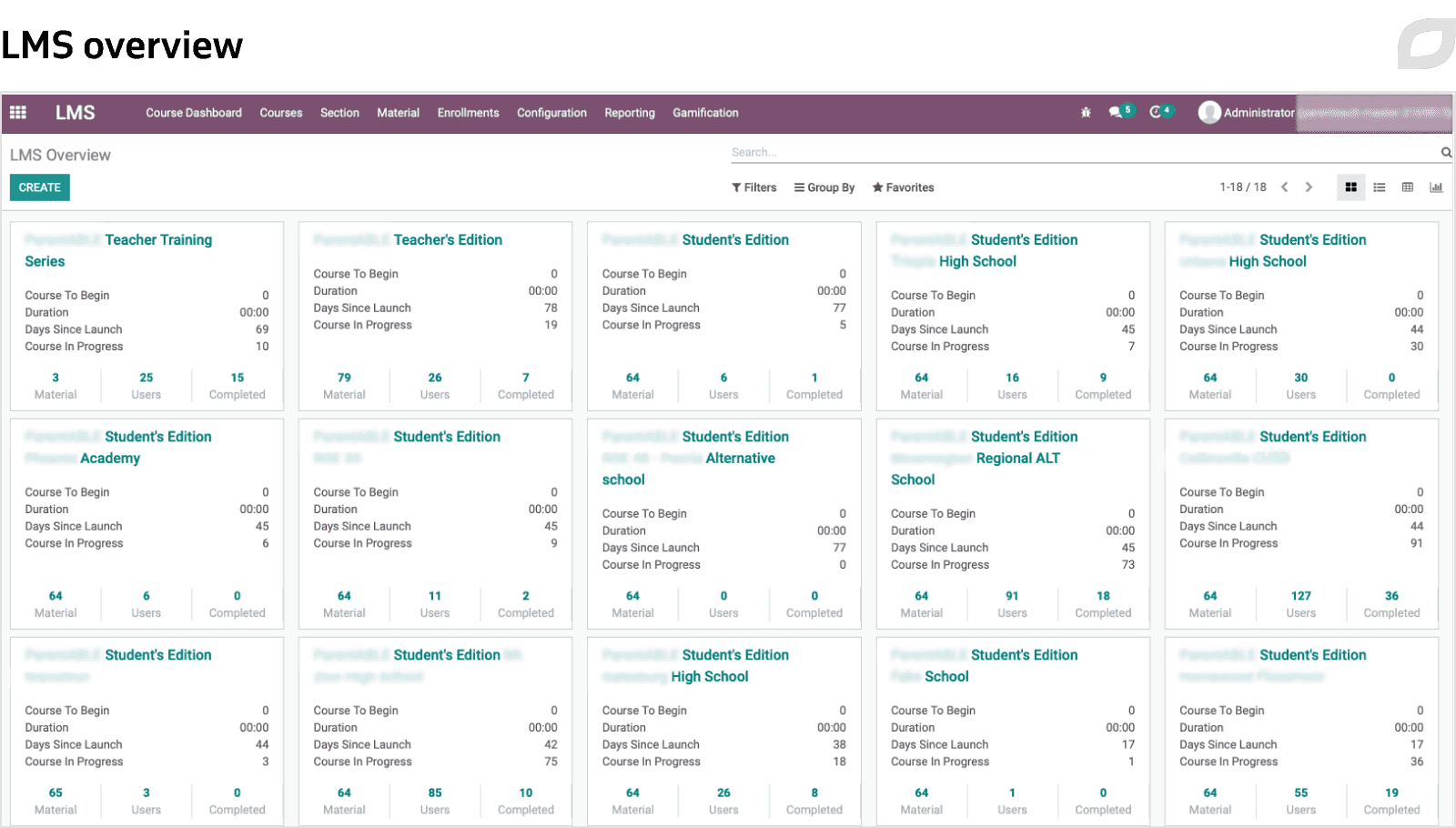
Having implemented the new solution, our team performed course migration from the customer’s legacy system. The course consisted of 8 lessons, 22 presentations, 20 videos, and 8 text materials. We were provided with links to all these resources in the customer’s internal storage, sorted them by the type and topic, and uploaded them to the Odoo system, ensuring upon completion that everything works fine and fixing minor bugs. As for quizzes and surveys, they were created directly in the Odoo system. Having all course materials in one place, we compiled the course.
As part of the project, our business analyst also prepared video instructions and text manuals on the proper use of the system for the customer’s employees.
Customizations
After the system implementation, our team fine-tuned the CRM module to ensure the automation of related business processes, such as creating a course based on a template, sending documents to a school for electronic signature, preparing reports, archiving students, and so on. We also enabled adding teachers, surveys and courses to an opportunity and defined limits for the portal, such as the maximum number of students.
Ultimately, we managed to automate the whole journey for schools, from applying and onboarding to the course initiation, implementation, and completion, with each user action triggering a new stage of the pipeline.
The examples of business process automation include the following:
- After an application survey is submitted from the client portal, the system creates an opportunity with the corresponding contact generated.
- When an MoU document is signed by all parties or when a teacher enrolls in a teaching course, the opportunity proceeds to the next stage.
- Once teachers complete the teacher course, the opportunity they are associated with moves to the student course stage.
- As soon as an opportunity proceeds to the final stage, students’ data gets archived, etc.
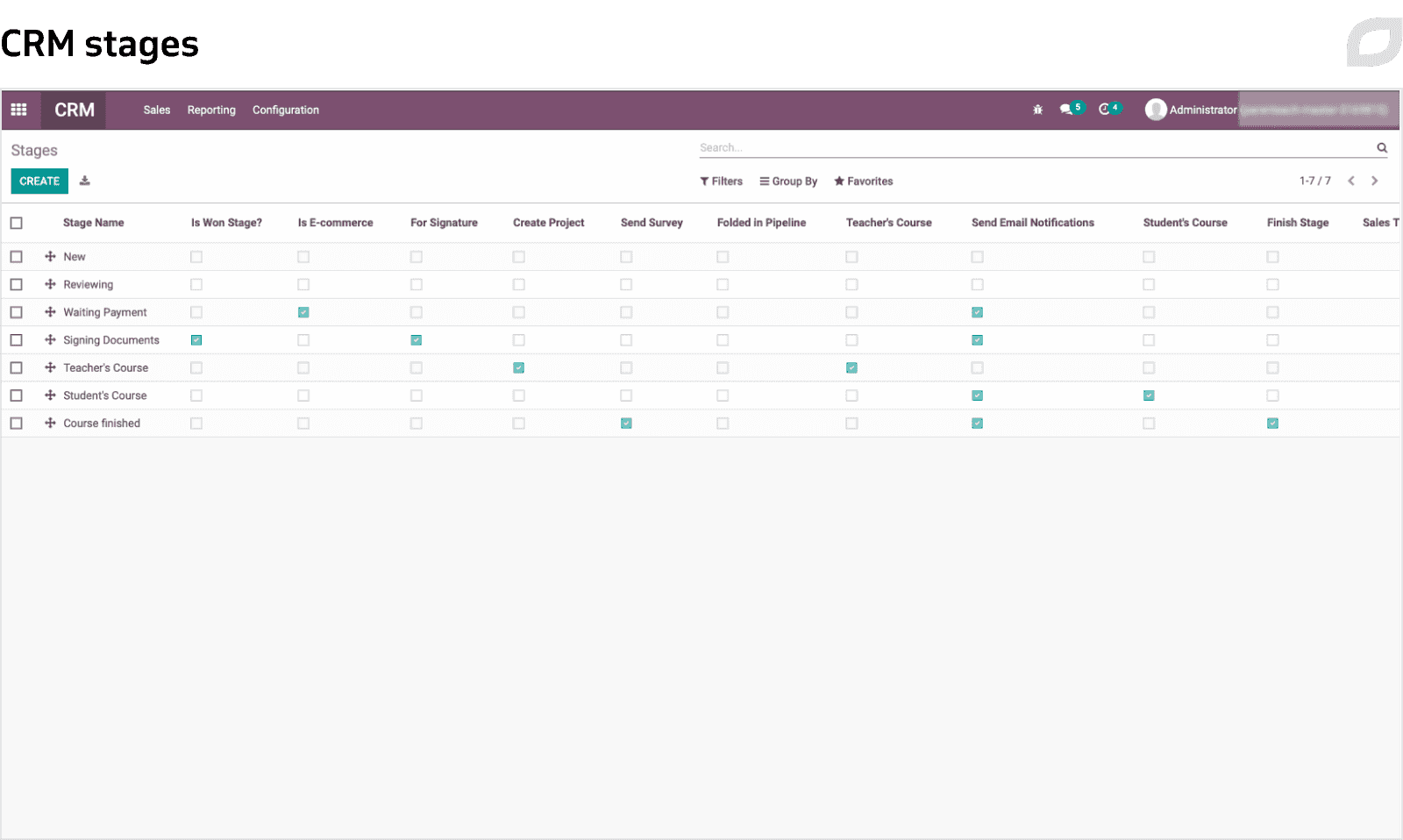
The OpenEduCat module, in its turn, enabled creating personal profiles for teachers and students on the website portal, granted students access to the course, and allowed for conducting surveys, quizzes, and final exams. Our team customized the module, enabling the implementation of teacher accounts in the portal without granting teachers access to the Odoo system itself. As portal users, teachers can monitor students’ progress and results, including quizzes and exams passed/failed and answers to questions, as well as view students’ final projects and grade them. The customization automated the process of adding students to the course and exams by sending them invitations to join. OpenEduCat also enabled organizing online meetings and sending invitations to teachers to participate in introductory seminars.
The standard Odoo eLearning module supported only embedding videos as links to Youtube and Vimeo by default. First, the customer wanted to be able to stream video lessons from a local server using the OpenEduCat module. However, to play a video, the user needs to download the file to their device which, given the large size of video files, could take a while. What is more, the most popular video hosting websites, such as Youtube and Vimeo, are often blocked in US schools. This is why we suggested using alternative video streaming platforms for uploading videos. With these platforms, the customer can embed videos right into the learning course for instant streaming.
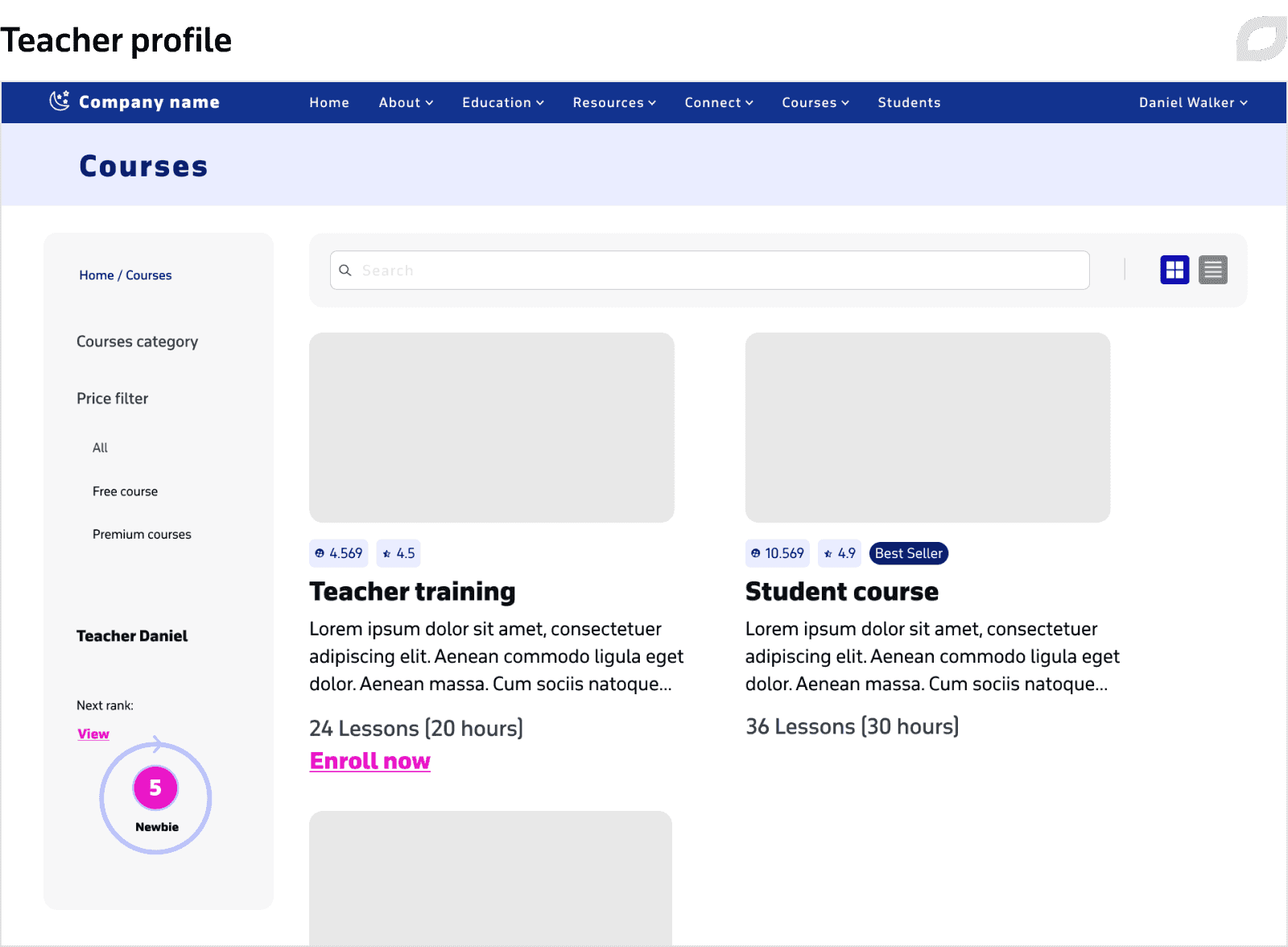
The customer also wanted us to let teachers view students’ course marks, quiz score points, and other achievements from their school systems either via the portal or Google Classroom. This is why our team created an integration with Google Classroom for seamless synchronization of students’ results.
For statistical and research purposes, the system allows for collecting survey data. Itransition created a reporting feature enabling the system to generate reports containing anonymized student results. The reports can be created during or at the end of a course and can be exported in the XLS format.
Results
Itransition delivered a full-blown LMS solution equipped with powerful ERP features, covering all of the customer’s needs, and enabling seamless processes. Choosing Odoo Enterprise hosted on the Odoo.sh platform allowed us to deliver additional functionality essential for the company’s workflows and helped the customer cut the expenses on DevOps activities by 10% by reducing the scope of admin tasks.

Services
Custom LMS: services, key features, integrations, and technologies
Explore Itransition’s custom Learning Management System implementation services, along with recommended features, integrations, technologies, and payoffs.

Services
Enterprise LMS: key features, top solutions & our services
Explore the features of enterprise LMS, integrations, and benefits, along with popular off-the-shelf platforms and tips to select or build your solution.

Case study
Corporate learning portal for PayPal
This is how Itransition delivered a platform-based new hire training portal for PayPal, helping to reduce the learning curve for newcomers.

Case study
A furniture manufacturing software suite
Read the story behind Itransition’s 5-year collaboration with a leading UK furniture manufacturer on web, mobile and VR solutions.

Insights
Rethinking workforce training with corporate eLearning
Let's discuss corporate eLearning's payoffs, key software solutions, latest tech trends, and implementation tips.
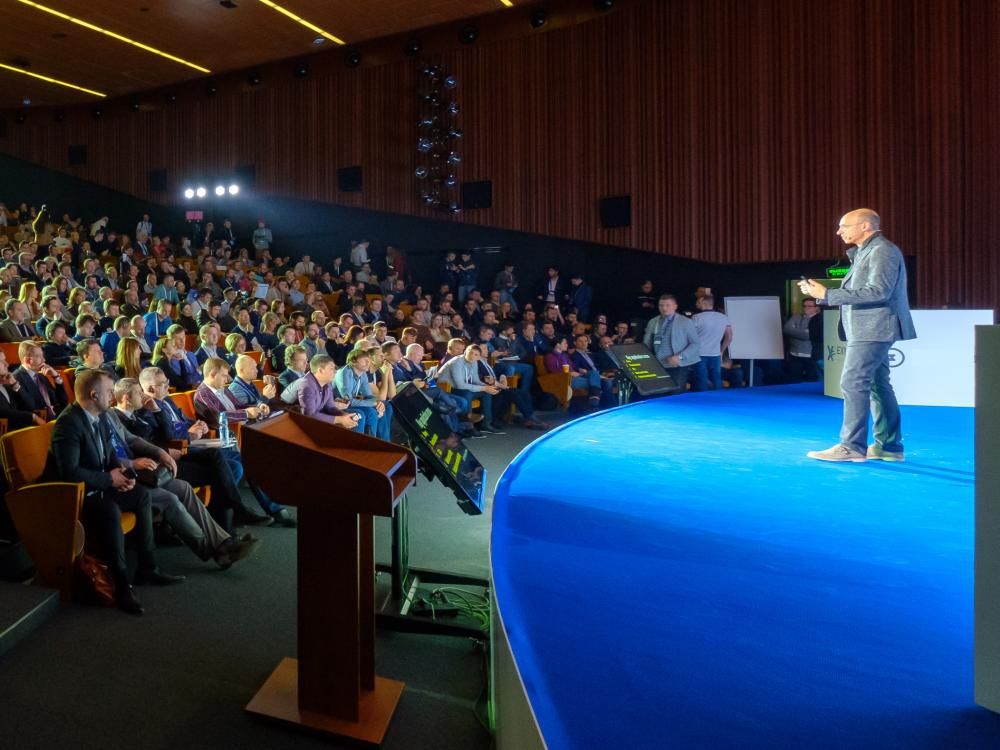
Case study
Custom conference management software for an educational society
Learn how Itransition delivered a suite of custom conference management software and enriched it with bespoke modules automating event organization.